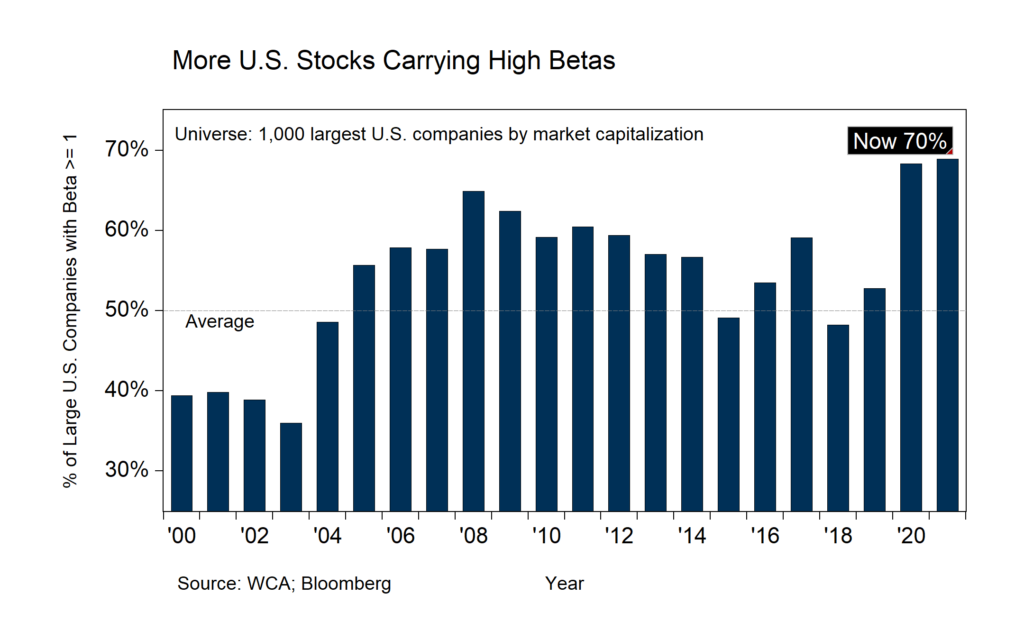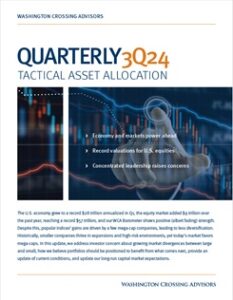Beta, Revisited
The U.S. stock market has soared to $52 trillion from $33 trillion in value in the past two years, a 56% rise. Naturally, many are now worried about holding on to gains after such a historic rise. With a favorable tailwind behind us, we want to discuss an oft-misunderstood measure of risk, called “beta.”
Beta is a measure of a stock or portfolio’s relative risk compared to the overall market. For U.S. investors, the S&P 500 index of large company domestic stocks is usually the market proxy. A security whose price moves up and down exactly with the market is said to have a beta of one. A more volatile stock would have a beta greater than one, and a less volatile one would have a beta less than one. So, it is natural to look for lower beta stocks if you are worried about an overall market decline.
Not So Fast
Before putting together a low beta portfolio, we must understand that fundamentals and risk are related. Less consistent, leveraged, and unprofitable businesses tend to be riskier than consistent, well-capitalized, profitable businesses, all else being equal. We believe that companies with shakier fundamentals will also tend to produce greater risk in a portfolio over time too. If so, we should see evidence of this tendency in data involving stock betas and fundamental company quality.
To test our hypothesis, we analyzed thousands of companies over the past twenty years, assigning a proprietary “WCA Quality Score” to each one on a quarter-by-quarter basis. The fundamental criteria of leverage, consistency, and profitability was the basis of the evaluation. We then looked at betas for the companies grouped by quality grade during the financial crisis of 2007-2009.
Table A below presents a summary distribution of betas by quality grade at the start and end of the financial crisis. Notice that lower-quality company betas tended to be higher than high quality during the crisis, indicating greater risk. But much more importantly, notice how the betas behaved during the period. The betas for low-quality companies shot up during the crisis, while betas for high-quality companies fell. Sharply rising risk is exactly what we do not want when the going gets tough, which is why we think investing in low-quality companies is potentially more dangerous than one might expect. By contrast, the relative risk of higher-quality companies fell when the going got tough, a positive defensive attribute.
Table A
What Happens to Beta During Stress?
Median Beta by WCA Fundamental Quality Grade (Large U.S. Stock Universe)
| Evaluation Period | A-Grade | B-Grade | C-Grade | D-Grade | F-Grade |
| =============== | ======= | ======= | ======= | ======= | ======= |
| Start of 2007-2009 Financial Crisis | 1.00 | 1.15 | 1.02 | 1.05 | 1.15 |
| End of 2007-2009 Financial Crisis | 0.91 | 1.00 | 1.16 | 1.22 | 1.66 |
| ======= | ======= | ======= | ======= | ======= | |
| Percent Change: | -9.0% | -13.0% | 13.7% | 16.2% | 44.3% |
Where are we Today?
We see that the percentage of companies with above-average betas are now at cycle highs. Chart A below shows that 70% of large U.S. companies now carry betas above 1, indicating a market of stocks with higher company-specific risk. The risk-on market environment of recent months rewarded the highest relative risk, lowest quality stocks. With market risk acceptance already high and the concentration of high-beta stocks in the market also at highs, a lapse into a more challenging environment could prove especially painful for high-risk, low-quality investors should such an environment emerge.
Chart A

Conclusion
We think now is not the time to chase risk but instead to stick with higher-quality companies. This does not mean blindly loading up on “low beta” stocks, however. While beta may be a valuable measure of past fluctuations of common stocks, in our view, it is an incomplete one. We believe marrying “beta” with an evaluation of fundamental quality is a much better way of addressing risk.
As lower quality, high-beta stocks lead the U.S. equity market valuations to new highs, now might be the right time to reexamine portfolio holdings focusing on higher fundamental quality.
Disclosures:
The Washington Crossing Advisors’ High Quality Index and Low Quality Index are objective, quantitative measures designed to identify quality in the top 1,000 U.S. companies. Ranked by fundamental factors, WCA grades companies from “A” (top quintile) to “F” (bottom quintile). Factors include debt relative to equity, asset profitability, and consistency in performance. Companies with lower debt, higher profitability, and greater consistency earn higher grades. These indices are reconstituted annually and rebalanced daily. For informational purposes only, and WCA Quality Grade indices do not reflect the performance of any WCA investment strategy.
Standard & Poor’s 500 Index (S&P 500) is a capitalization-weighted index that is generally considered representative of the U.S. large capitalization market.
The S&P 500 Equal Weight Index is the equal-weight version of the widely regarded Standard & Poor’s 500 Index, which is generally considered representative of the U.S. large capitalization market. The index has the same constituents as the capitalization-weighted S&P 500, but each company in the index is allocated a fixed weight of 0.20% at each quarterly rebalancing.
The information contained herein has been prepared from sources believed to be reliable but is not guaranteed by us and is not a complete summary or statement of all available data, nor is it considered an offer to buy or sell any securities referred to herein. Opinions expressed are subject to change without notice and do not take into account the particular investment objectives, financial situation, or needs of individual investors. There is no guarantee that the figures or opinions forecast in this report will be realized or achieved. Employees of Stifel, Nicolaus & Company, Incorporated or its affiliates may, at times, release written or oral commentary, technical analysis, or trading strategies that differ from the opinions expressed within. Past performance is no guarantee of future results. Indices are unmanaged, and you cannot invest directly in an index.
Asset allocation and diversification do not ensure a profit and may not protect against loss. There are special considerations associated with international investing, including the risk of currency fluctuations and political and economic events. Changes in market conditions or a company’s financial condition may impact a company’s ability to continue to pay dividends, and companies may also choose to discontinue dividend payments. Investing in emerging markets may involve greater risk and volatility than investing in more developed countries. Due to their narrow focus, sector-based investments typically exhibit greater volatility. Small-company stocks are typically more volatile and carry additional risks since smaller companies generally are not as well established as larger companies. Property values can fall due to environmental, economic, or other reasons, and changes in interest rates can negatively impact the performance of real estate companies. When investing in bonds, it is important to note that as interest rates rise, bond prices will fall. High-yield bonds have greater credit risk than higher-quality bonds. Bond laddering does not assure a profit or protect against loss in a declining market. The risk of loss in trading commodities and futures can be substantial. You should therefore carefully consider whether such trading is suitable for you in light of your financial condition. The high degree of leverage that is often obtainable in commodity trading can work against you as well as for you. The use of leverage can lead to large losses as well as gains. Changes in market conditions or a company’s financial condition may impact a company’s ability to continue to pay dividends, and companies may also choose to discontinue dividend payments.
All investments involve risk, including loss of principal, and there is no guarantee that investment objectives will be met. It is important to review your investment objectives, risk tolerance, and liquidity needs before choosing an investment style or manager. Equity investments are subject generally to market, market sector, market liquidity, issuer, and investment style risks, among other factors to varying degrees. Fixed Income investments are subject to market, market liquidity, issuer, investment style, interest rate, credit quality, and call risks, among other factors to varying degrees.
This commentary often expresses opinions about the direction of market, investment sector, and other trends. The opinions should not be considered predictions of future results. The information contained in this report is based on sources believed to be reliable, but is not guaranteed and not necessarily complete.
The securities discussed in this material were selected due to recent changes in the strategies. This selection criterion is not based on any measurement of performance of the underlying security.
Washington Crossing Advisors, LLC is a wholly-owned subsidiary and affiliated SEC Registered Investment Adviser of Stifel Financial Corp (NYSE: SF). Registration with the SEC implies no level of sophistication in investment management.



